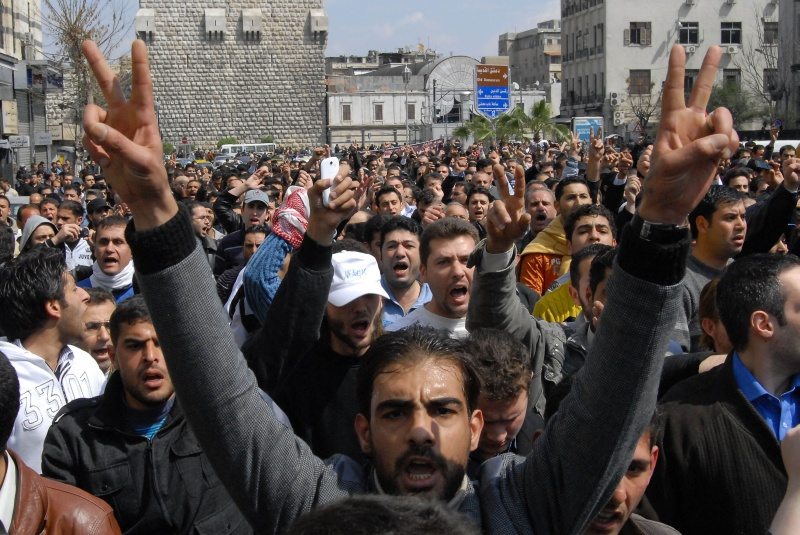More deaths were reported after Syria bolstered its troops in the flashpoint town of Daraa as a rights group appealed for UN intervention in a bloody crackdown it said has killed 400 people since mid-March.
UN leader Ban Ki-moon and western nations expressed growing alarm at the deadly clampdown in Syria, but the UN Security Council made little headway in efforts to agree to condemn the violence.
As the Daraa crackdown raged into a second day, Security Council nations discussed a statement proposed by four European powers who want to condemn deadly violence against protesters in Syria.
But the United States said that for now it will limit its response to the violent crackdown on civilian protests in Syria to diplomacy and possible sanctions.
Outlining the US approach to Syria on Tuesday, Jacob Sullivan, director for strategic policy, said Washington’s “focus is… in the diplomatic and financial space at the moment.”
“At the moment, we’re not actively considering shutting down our embassy in Syria,” said Sullivan, a close adviser to US Secretary of State Hillary Clinton.
A militant in Daraa, epicentre of the revolt, said Syrian security forces shot dead at least six people in the southern town on Tuesday.
Human rights activist Abdullah Abazid said he had a list of the names of the “martyrs” who included the imam of a mosque. Intensive firing was heard late into the night in Daraa, he added.
Late on Tuesday, the state news agency SANA reported the army “continued to chase armed groups and extremists in Daraa who attacked military positions, cut off roads and forced passers-by to stop so they could hit them.”
The Daraa operation came four days after President Bashar al-Assad scrapped nearly five decades of draconian emergency rule and abolished the repressive state security court as he faced growing dissent and calls for reform.
Washington previously ordered non-essential embassy staff out of Syria, which has been shaken by six weeks of protests against Assad’s autocratic rule.
Amnesty International called for the Security Council to refer the situation to the International Criminal Court.
And UN rights chief Navi Pillay was invited to visit Damascus, a spokesman said, urging authorities to probe the killing of protesters.
Security forces firing live rounds and tear gas have killed over 400 people since March 15, activists say, including 25 on Monday alone in Daraa, while scores have been arrested.
“Syrian security forces fired on unarmed protesters killing 400 people at least since the revolution was launched in March,” the Syrian Human Rights Organisation (Swasiah) said in a statement.
“This barbaric behaviour is aimed at keeping the regime in place at the expense of civilians who are killed… The Security Council must convene rapidly to stop the bloodshed.”
British Defence Minister Liam Fox said Tuesday there were “practical limitations” to any foreign intervention in Syria, despite NATO taking military action in Libya under similar conditions.
Asked why Western governments had backed armed intervention to protect civilian lives in Libya but not in Syria, Fox said “there are limitations to what we can do.”
On Monday, 3,000-5,000 Syrian troops backed by tanks and snipers rolled into Daraa, residents and Abazid said.
Farther north in the protest hub of Banias, thousands took to the streets on Tuesday, chanting “freedom, freedom,” amid reports an assault was imminent.
One rights activist who declined to be identified suggested forces had deployed on hills around Banias in preparation for an attack.
Security forces also deployed in the northern Damascus suburb of Douma where they set up identity checkpoints, a witness told AFP.
The Douma crackdown began on Monday and also targeted nearby Al-Maadamiyeh.
By Tuesday afternoon, Douma had become a “ghost town,” one resident told AFP by telephone.
Security forces arrested three doctors from Douma’s Hamdan hospital and forced patients to leave, even those in intensive care, witnesses said.
Also on Tuesday, authorities referred prominent dissident Mahmud Issa to a military court for owning a satellite phone, after he was interviewed by Al-Jazeera, said Rami Abdel Rahman of the Syrian Observatory for Human Rights.
Issa was twice jailed in Syria for a total of 11 years.
He said activist Qassem Azzawi was arrested on Tuesday for joining a protest last week, and that 43 people had been rounded up since Monday in countrywide raids but 11 others were freed on Tuesday.
At the United Nations meanwhile, Secretary General Ban said he was watching events in Syria “with increasingly grave concern,” after briefing the 15-nation Security Council about the crisis in the Arab world.
“I condemn, utterly, the continuing violence against peaceful demonstrators, most particularly the use of tanks and live fire that have killed and injured hundreds of people,” he added.
Britain and France have made calls for “strong” action against the violence by Assad’s forces.
Whether a statement is agreed will depend on the attitude of Russia and China, which traditionally resist initiatives they see as interfering in a country’s internal affairs.
As he entered the Security Council, China’s ambassador Li Baodong said he would “push for a political solution” in Syria.
“We are going to study the draft elements very seriously,” he told reporters.










